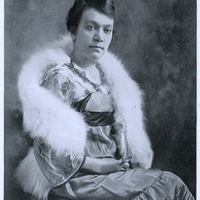Coralie Franklin Cook
Item
-
Title
-
Coralie Franklin Cook
-
Description
-
Coralie Franklin Cook was born into slavery in Lexington, Virginia, in 1861, a descendent of the Hemings family that was enslaved by Thomas Jefferson. She was a trained educator, a noted public speaker, a community leader, and a suffragist. Franklin Cook graduated from Storer College in Harpers Ferry, West Virginia, in 1880. She studied and went on to teach English and Elocution at Storer from 1882 to 1893. She married Geore William Cook, a professor at Howard University. Cook went on to teach at Howard as well and later the Washington Conservatory of Music. Active in civic life in Washington, DC, she was the second Black woman to serve on the District of Columbia Board of Education, serving for twelve years.
An early participant in clubs for Black women in the DC area, Coralie Franklin Cook was a founder of the National Association of Colored Women (NACW) formed in 1896. Women’s suffrage was an important issue for the NACW but not its single focus. Suffrage was viewed as means to improve lives of all Black people living in segregation and linked to ensuring voting rights for Black men who were disenfranchised through literacy tests, poll taxes, and grandfather clauses.
She was also a member of the National American Women Suffrage Association (NAWSA), the dominant suffrage organization in the United States. While the NAWSA admitted Black women, they held conventions in which Black women were excluded and forced Black women to march separately in suffrage parades. Cook was the only Black woman invited to speak at Susan B. Anthony’s 80th birthday celebration in 1900. She offered her disappointment in the lack of concern for Black women’s rights stating, “...no woman and no class of women can be degraded and all women kind not suffer thereby.”
In 1915, Coralie Franklin Cook wrote a piece entitled “Votes for Mothers” in a suffrage-themed issue of the NAACP magazine, the Crisis. Although questioning the focus on the motherly role of women, Cook noted that the ability to “make and administer the laws under which she lives” would assist women in their maternal duties. She further emphasized suffrage for women of color noting that, “Disfranchisement [sic] because of sex is curiously like disfranchisement because of color. It cripples the individual, it handicaps progress, it sets a limitation upon mental and spiritual development.”
Cook lived to see the passage of the 19th amendment in 1920 and continued to serve her DC community
 Coralie Franklin Cook
Coralie Franklin Cook